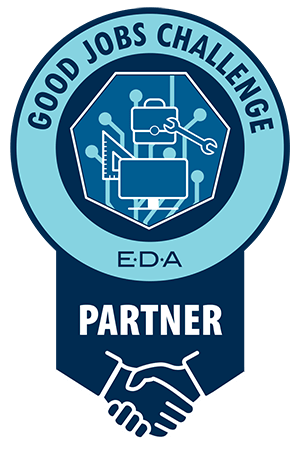UMass Global received the grant to create workforce development programs that connect employers with trained workers, providing job opportunities for Americans to achieve economic mobility and security.
Overview
The Good Jobs Challenge (GJC), which is part of the American Rescue Plan, is a $500 million grant funded by the US Economic Development Administration (EDA). The GJC prioritizes workforce development through meaningful partnerships that connect employers with a trained workforce while providing good job opportunities for American workers to achieve economic mobility and security.
The Economic Development and Industrial Corporation (EDIC) of Boston was awarded $23 million in the key industries of healthcare, energy and resilience, and childcare. In partnership with Mass General Brigham (MGB), UMass Global was awarded $5 million (out of $23 million) with the goal of filling 1,000 positions in the healthcare sector by September 2025.
To learn more about the Good Jobs Challenge grant, visit U.S. Economic Development Administration website.

Health Systems Medical Assistant
Medical Assistants support both clinical and administrative functions by taking patient medical histories, explaining treatment procedures, and preparing patients for examinations. They also assist physicians during exams, ensuring a smooth and efficient patient care experience.

Patient Care Technician
Patient Care Technician provides essential bedside care, assist with daily living activities, and help monitor patient conditions. They support the nursing team by preparing equipment, collecting specimens, and ensuring a clean, safe environment.

Practice Assistant
Practice Assistants play a key role in clinical settings by managing front office operations such as answering phones, scheduling appointments, and greeting patients. They also handle a variety of administrative tasks to ensure smooth and efficient clinic workflow.
Data collected from participants of the Good Jobs Challenge grant will be uploaded to the U.S. Census Bureau.
All Personally Identifiable Information (PII) is collected and stored under a Census Bureau System of Records Notices (SORN). A SORN is a notice published in the Federal Register, required by the Privacy Act of 1974, intended to alert the public that a Federal agency has created, modified, or abolished a system of records (SOR). A SOR is a compilation of multiple records, containing information about individuals retrieved by some identifying number, symbol, or personal identifier (such as name, employee number, social security number (SSN), etc.).
The PII is also subject to Title 13 of the United States Code. The Census Bureau is bound by Title 13 of the United States Code. These laws not only provide authority for the work we do, but also provide strong protection for the information we collect from individuals and businesses.
Title 13 provides the following protections to individuals and businesses:
- Private information is never published. It is against the law to disclose or publish any private information that identifies an individual or business such as, names, addresses (including GPS coordinates), Social Security Numbers, and telephone numbers.
- The Census Bureau collects information to produce statistics. Personal information cannot be used against respondents by any government agency or court.
- Census Bureau employees are sworn to protect confidentiality. People sworn to uphold Title 13 are legally required to maintain the confidentiality of your data. Every person with access to your data is sworn for life to protect your information and understands that the penalties for violating this law are applicable for a lifetime.
- Violating the law is a serious federal crime. Anyone who violates this law will face severe penalties, including a federal prison sentence of up to five years, a fine of up to $250,000, or both.
It is important to note that evaluators of this program will receive de-identified data and will only be able to report on findings with sample sizes large enough to ensure the anonymity of program participants. Any PII collected through this program will only be used for the purposes of evaluating this program and as referenced above, “Personal information cannot be used against respondents by any government agency or court” and “every person with access to your data is sworn for life to protect your information and understands that the penalties for violating this law are applicable for a lifetime.”
Data collected from participants of the Good Jobs Challenge grant will be uploaded to the U.S. Census Bureau.
All Personally Identifiable Information (PII) is collected and stored under a Census Bureau System of Records Notices (SORN). A SORN is a notice published in the Federal Register, required by the Privacy Act of 1974, intended to alert the public that a Federal agency has created, modified, or abolished a system of records (SOR). A SOR is a compilation of multiple records, containing information about individuals retrieved by some identifying number, symbol, or personal identifier (such as name, employee number, social security number (SSN), etc.).
The PII is also subject to Title 13 of the United States Code. The Census Bureau is bound by Title 13 of the United States Code. These laws not only provide authority for the work we do, but also provide strong protection for the information we collect from individuals and businesses.
Title 13 provides the following protections to individuals and businesses:
- Private information is never published. It is against the law to disclose or publish any private information that identifies an individual or business such as, names, addresses (including GPS coordinates), Social Security Numbers, and telephone numbers.
- The Census Bureau collects information to produce statistics. Personal information cannot be used against respondents by any government agency or court.
- Census Bureau employees are sworn to protect confidentiality. People sworn to uphold Title 13 are legally required to maintain the confidentiality of your data. Every person with access to your data is sworn for life to protect your information and understands that the penalties for violating this law are applicable for a lifetime.
- Violating the law is a serious federal crime. Anyone who violates this law will face severe penalties, including a federal prison sentence of up to five years, a fine of up to $250,000, or both.
It is important to note that evaluators of this program will receive de-identified data and will only be able to report on findings with sample sizes large enough to ensure the anonymity of program participants. Any PII collected through this program will only be used for the purposes of evaluating this program and as referenced above, “Personal information cannot be used against respondents by any government agency or court” and “every person with access to your data is sworn for life to protect your information and understands that the penalties for violating this law are applicable for a lifetime.”
The purpose of this data collection is to gain deeper insights into the effectiveness of workforce development programs on workers who have historically faced barriers to attaining good jobs. Participant-level data is needed to link individuals to a variety of demographic, household, and wage data at Census. This data enables a more accurate analysis of workers than what could be attained from one survey alone. Additionally, by linking participants to Census data, regional workforce systems are not required to collect additional participant information on demographics and personal background but may do so for their own performance and evaluation purposes.
It is further important to note that participant level data is de-identified before reaching the research and evaluation team and EDA will only report out on participant level data in aggregate.
You can find the information about all awardees on the Good Jobs Challenge website.
There are two general categories the survey data falls into, Title 13 and non-Title 13 data.
- Title 13 data includes de-identified data that has been linked to Census data to gain insights into the economic and demographic characteristics of participants. Only researchers with Special Sworn Status will have access to this de-identified data.
- Non-Title-13 data is not personally identifiable information and may include information about the system lead entity, sectoral partnerships, and programmatic details of the training programs. This information will be available to designated individuals internal to EDA and EDA research partners for analyzing program performance on a quarterly basis. EDA will only report out on participant level data in aggregate and above a participant size that will ensure participants cannot be identified.
EDA will utilize this information internally at the U.S. Department of Commerce. As this work continues, EDA will also coordinate with our federal agency partners, and other stakeholders, to build further understanding of program findings. As noted above, EDA will only report out on participant-level data in aggregate and above a participant size that will ensure participants cannot be identified.
Participant personally identifiable information will be reported directly to Census. This data will be de-identified and linked to Census datasets, including the Decennial Census, Longitudinal Employer-Household Dynamics, American Community Survey, the Current Population Survey, and others. Participant-level information is required to link participants with Census databases.
All University of Massachusetts Global programs are accredited by WSCUC, assuring that the University meets quality standards established by the U.S. Department of Education. Explore the additional program and professional accreditations UMass Global holds. Read More: https://www.umassglobal.edu/about/accreditations
Please email the School of Extended Education at ExEdHealthcare@umassglobal.edu or call (800) 632-0094.


